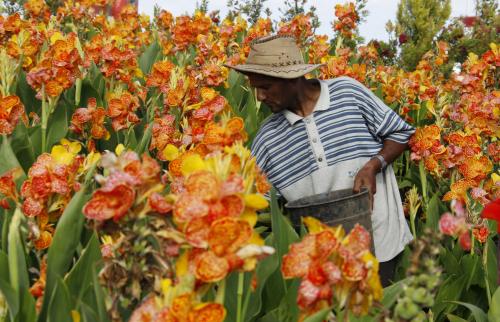Content from the Brookings Doha Center is now archived. In September 2021, after 14 years of impactful partnership, Brookings and the Brookings Doha Center announced that they were ending their affiliation. The Brookings Doha Center is now the Middle East Council on Global Affairs, a separate public policy institution based in Qatar.
EXECUTIVE SUMMARY
Natural resources, such as oil and gas, are commonly viewed as catalysts of conflict. Because individuals, ethnic groups, and governments often see control of scarce resources through the lens of a zero-sum game, they compete with each other over ownership. Competition can easily spill into conflict. For this reason, it may seem odd to ask whether oil and gas pipelines can contribute to resolving existing conflicts between states. This paper argues that they can; under the right conditions, a shared need for resource commerce can be a means of fostering cooperation between states.
While water resources have frequently been considered in cooperative terms, little policy attention has been paid to the role of transboundary oil and gas infrastructure in strengthening interstate relations. Due to the permanence of their infrastructure, pipelines are likely to have a more lasting impact and create greater incentives for cooperation over time. While not without drawbacks, pipelines remain the most effective and economical means of transport, and their role is likely to grow rapidly in the years ahead. Gas-rich countries, such as Iran, Pakistan, Qatar, and Saudi Arabia are well positioned to play a greater role in energy transport. A major obstacle, however, is persuading investors to support pipeline ventures in areas vulnerable to political instability and security risks. But it is precisely in such areas where pipelines can play a positive role in easing tensions and promoting cooperation between states. Considering that world demand for gas is growing faster than supply, pipelines have the potential to play an increasingly important role in facilitating regional security from Morocco to Afghanistan.
This paper will review the performance of existing routes in the Middle East and North Africa to glean lessons for proposed pipelines in Southwest Asia. Pipelines have contributed to the thawing of relations between Algeria and Morocco as well as Italy and Libya. Within the Gulf, the “Dolphin Project,” passing from Qatar to the United Arab Emirates (UAE), has contributed to the resolution of border disputes between the UAE and Oman and between Qatar and Saudi Arabia. Interestingly, Egypt has become an important pipeline builder and supplier of gas to its neighbors, including Israel.
Proposed Asian routes, including the Iran-Pakistan- India (IPI) and Turkmenistan-Afghanistan- Pakistan (TAP) projects, may potentially spur cooperation in critical, conflict-ridden areas. Importantly, within countries, pipelines can provide much-needed employment and revenue, in the process quelling some of the domestic resentment that fuels extremism. However, the ambivalence with which the United States and other powers have approached natural resources in Central Asia has confounded the prospects for pipeline development.
With sufficient political will – and a more informed understanding of the binding power of pipelines – the United States, European countries, and international bodies can begin to utilize pipeline construction as both an engine of cooperation and a tool of diplomacy. What is needed is a longterm policy outlook that integrates energy transit and transport as part of a broader framework for economic and security cooperation. In this vein, the paper proposes a number of policyrecommendations for both the international community and countries directly involved in pipeline source, transit, and point of demand.
RECOMMENDATIONS FOR THE INTERNATIONAL COMMUNITY
From extraction to transportation to consumption, the oil and gas sector encompasses strategic government interests as well as private sector involvement. With the nearly universal reliance of countries on oil and gas to meet energy needs, it is a sector of utmost importance for regional security. Accordingly, the international community has an abiding interest in maintaining its functionality and improving its effectiveness. With this in mind, the international community, particularly major powers like the United States, should consider the following recommendations to realize the cooperative potential of pipelines:
• International donors should give priority to infrastructure projects that have potential to spur cooperation, particularly in the gas sector.
• Efforts by the Energy Charter Secretariat to develop an international legal regime applicable to pipelines, known as the Transit Protocol, deserve to be supported. In particular, the dispute resolution mechanism established under the Energy Charter should be developed to facilitate the routing of pipelines that run into disputes over fees and planning logistics.
• Regional development organizations such as the Association of Southeast Asian Nations (ASEAN) and the Gulf Cooperation Council (GCC) should consider pipeline projects as a facilitative tool toward meeting their regional cooperation targets and set up working groups to develop such projects.
Pipelines have played an important role in bridging differences in numerous cases among a number of states. More, however, can be done. Proper leadership from the international community and a confluence of economic and political incentives will prove instrumental in ensuring pipelines become conduits of peace-building.
RECOMMENDATIONS FOR GAS-PRODUCING COUNTRIES
Given that the global distribution of gas is concentrated in a few countries, the choices these countries make will be of great global significance. In this context, gas-producing countries should consider the following recommendations:
• Incorporate gas in long-term portfolios, particularly in the transportation sector but also for basic power generation. Often, the infrastructure needed to produce, distribute, and use energy is developed over not years but decades. Accordingly, a commitment to pipeline development should be institutionalized at a high level to ensure policy durability.
• Diversify gas transport. Given geopolitical uncertainty, countries should diversify transport mechanisms for gas delivery in order to absorb risk.
• Focus on fixed infrastructure. The “permanent” infrastructure of pipelines brings positive spillover effects, creating lasting incentives for cooperation on broader economic and security concerns.
• Explore and establish partnerships with international development banks for financing and environmental impact assessment

